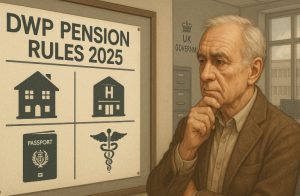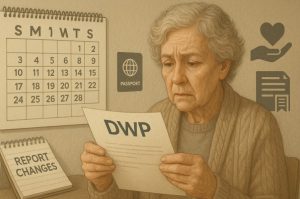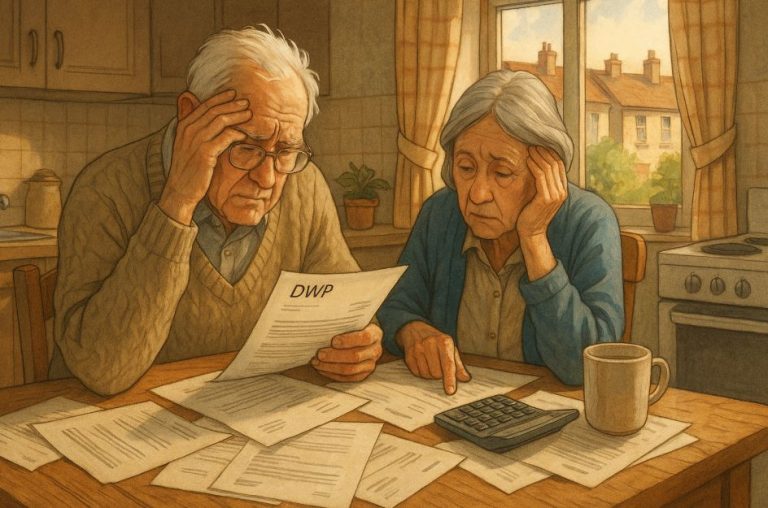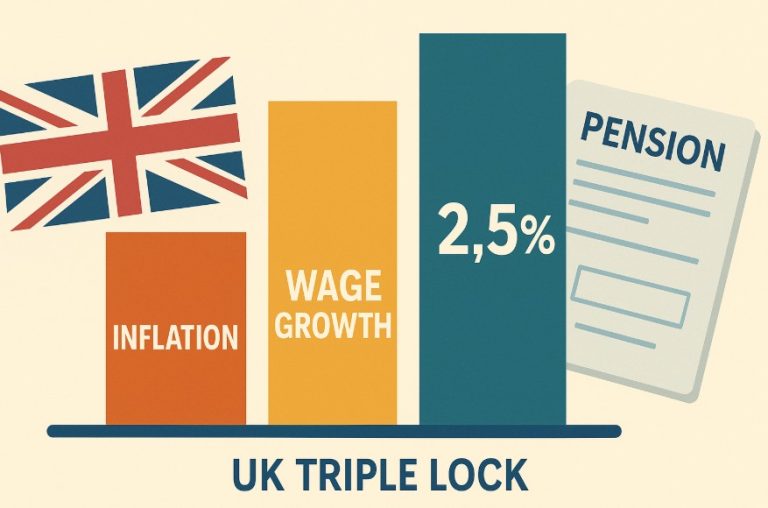The Department for Work and Pensions (DWP) plays a critical role in managing the UK’s state pension system.
Recent rule changes and stricter reporting requirements have increased the risk of pension reductions or payment suspensions, particularly for those receiving Attendance Allowance. Understanding these updates is essential for pensioners to maintain their entitlements.
This blog outlines the latest DWP regulations, how they impact pension eligibility, and what steps individuals must take to remain compliant with current government guidelines.
What Are the Latest DWP Rules That Could Affect State Pension Payments?

In 2025, the Department for Work and Pensions (DWP) implemented several regulatory updates that directly impact how state pension and associated benefits are managed across the UK.
These rules aim to increase oversight, reduce overpayments, and ensure benefits are being distributed fairly and accurately.
While the core eligibility for the State Pension remains based on National Insurance contributions, several changes influence how payments are maintained, monitored, and adjusted over time.
A central area of focus is Attendance Allowance, a non-means-tested benefit available to individuals over the state pension age who require help or supervision due to illness, disability, or frailty.
Though it does not affect the amount of State Pension directly, failing to comply with Attendance Allowance rules can lead to the suspension of benefits or even trigger a wider reassessment of your entitlements.
The DWP has clarified and reinforced its stance on mandatory reporting of changes in personal circumstances.
Pensioners are now required to notify the DWP of any relevant changes as soon as they occur. Failure to do so can result in penalties, repayment demands, or the complete stoppage of benefits.
Some of the key updates to DWP rules affecting pensioners include:
- Reporting responsibilities: Individuals must report any changes to their condition, care needs, living arrangements, or medical status. This includes hospital stays longer than 28 days, moving into a care home, or a diagnosis of terminal illness.
- Overseas travel: If a claimant plans to leave the UK for more than four consecutive weeks, they must inform the DWP. Extended absence without notice can result in the suspension of benefits such as Attendance Allowance or Pension Credit.
- Financial reassessment: A change in income or capital, even from sources like inheritance or savings, can trigger a reassessment of means-tested benefits that support or supplement the State Pension.
- Address and identity changes: Even simple updates like a change in name, GP, bank account details, or residency status must be reported to ensure there is no interruption to benefit payments.
In addition to these procedural changes, the DWP is making increasing use of automated data-sharing and cross-checking tools to verify information provided by pensioners.
This includes accessing hospital records, travel data, and other government-held information to validate continued eligibility.
The department has also issued clear warnings that failure to provide accurate or updated information may result not only in the cessation of benefits but in legal action.
In some cases, overpayments caused by non-disclosure can be recovered through deductions from future payments or through direct repayment plans. If fraud is suspected, cases can be referred for prosecution.
These updates reflect the government’s commitment to maintaining a sustainable benefits system while reducing the risk of abuse or administrative error. For pensioners, understanding these rules is essential to avoid disruption and to ensure they receive the support they are entitled to without complications.
Why Might the DWP Reduce or Stop Your State Pension?

While the UK State Pension is primarily based on an individual’s National Insurance (NI) record, there are several scenarios in which the Department for Work and Pensions (DWP) may reduce or stop pension payments altogether.
These decisions are typically driven by changes in personal circumstances, failure to meet eligibility requirements, or administrative breaches that go unreported by the claimant.
It is essential to understand that the DWP does not usually stop pension payments without reason. However, pensioners have legal responsibilities to keep their personal information and circumstances updated.
In 2025, with growing emphasis on compliance and transparency, the DWP has tightened its monitoring and reporting expectations, particularly for those receiving additional benefits alongside their pension, such as Attendance Allowance, Pension Credit, or Housing Benefit.
Some of the most common reasons why the DWP may reduce or stop your pension or related payments include:
1. Failure to Report Changes in Circumstances
This is one of the most significant causes of payment issues. If a pensioner experiences a change in their health, care requirements, living arrangements, or travel plans and fails to report it promptly, the DWP may reassess their entitlement or stop payments. Common changes that must be reported include:
- Admission to a hospital or care home for an extended period
- Reduction in the level of personal care needed
- A medical professional confirming a change in diagnosis (e.g., terminal illness)
- Ceasing to have a carer or changing your GP
- Moving house, changing your bank account, or name
The DWP considers it the claimant’s responsibility to report these changes as soon as possible. Delays or omissions, even if unintentional, can lead to overpayments which will need to be repaid.
2. Extended Absence from the UK
The DWP requires that pensioners notify them if they intend to travel abroad for more than four weeks at a time.
While the State Pension itself can generally be paid internationally, some additional benefits, particularly Attendance Allowance and Pension Credit, are affected by extended periods outside the UK.
For example, if a pensioner leaves the country without notifying the DWP and continues to receive benefits that depend on UK residency, the payments may be stopped and later reclaimed. In some cases, the pensioner may also be disqualified from receiving certain benefits in the future.
3. Residency or Immigration Status Changes
Non-British nationals or individuals with conditional immigration status must also ensure their status is up to date with the Home Office and the DWP.
If a pensioner’s residency status changes or they are no longer entitled to remain in the UK, this can result in their pension or associated benefits being reduced or halted.
This is particularly important for older adults who have lived in the UK for many years but may not have formally updated their settled status or indefinite leave to remain under post-Brexit immigration policies.
4. Imprisonment or Legal Detention
If a pensioner is sentenced to prison or placed in legal custody, the DWP may suspend or stop certain benefits during the duration of their sentence.
While the State Pension may continue in some situations, benefits like Pension Credit and Attendance Allowance are typically stopped or reduced while the individual is incarcerated.
5. Administrative Errors or Incomplete Records
In some cases, a pension may be reduced or stopped due to errors in DWP records or missing documentation. This may include:
- Gaps in National Insurance contribution history
- Outdated contact or banking information
- Miscalculations during the claims process
It’s important for pensioners to regularly check their State Pension forecast and NI contribution record using the government’s online tools. This helps to identify any potential discrepancies that could later result in a disruption of payments.
6. Evidence of Fraud or Deliberate Misreporting
Deliberately providing false information to the DWP or failing to disclose important facts can result in severe penalties. These may include:
- Immediate suspension of all benefits
- Recovery of overpaid amounts through deductions or legal action
- Fines or civil penalties
- Prosecution and a criminal record
The DWP now uses advanced data-sharing systems to detect fraud, including checking against health records, benefit databases, and even border control data. This means discrepancies are more likely to be identified quickly.
Who Is Most at Risk of Losing Attendance Allowance or State Pension Benefits?
Some groups are more vulnerable to changes or reductions in state pension payments, especially those relying on Attendance Allowance.
Pensioners with long-term or progressive health conditions must pay close attention to their DWP obligations.
Conditions that commonly lead to benefit support include:
- Neurological diseases such as Parkinson’s, Multiple Sclerosis, and epilepsy
- Physical disabilities like amputations, arthritis, and back injuries
- Chronic illnesses including heart disease, diabetes, and respiratory conditions
- Cognitive disorders such as dementia and psychosis
In addition to these medical factors, lifestyle changes like entering care homes or living abroad without notification can also trigger a reduction in payments.
The DWP monitors these circumstances closely. If any change occurs that may influence the amount or continuation of payments, the claimant is expected to report it within a reasonable time frame.
How Do Medical Conditions Impact State Pension Eligibility in the UK?
While the state pension itself is largely based on National Insurance contributions, related benefits such as Attendance Allowance are heavily dependent on the medical conditions and care needs of the claimant.
Attendance Allowance is split into two rates, depending on the level of supervision or assistance required.
The weekly amounts are reviewed annually, and qualifying conditions must be medically verified.
Conditions Commonly Eligible for Attendance Allowance
| Category | Examples |
| Physical Disabilities | Arthritis, back injuries, amputations |
| Sensory Impairments | Blindness, deafness, deaf/blind |
| Neurological Disorders | Parkinson’s, Multiple Sclerosis, epilepsy |
| Cognitive and Mental Health | Dementia, psychosis, learning disabilities |
| Chronic Illnesses | Diabetes, asthma, COPD, heart disease |
| Terminal Illness | Confirmed by a medical professional with less than 12 months |
To qualify for Attendance Allowance, individuals must have required help for at least six months prior to claiming, unless they are terminally ill.
The benefit does not cover mobility needs but focuses on daily personal care or supervision requirements.
What Happens If You Fail to Report a Change in Circumstances?

The DWP has clearly stated that not reporting a change in circumstances can lead to serious consequences.
These consequences depend on whether the non-reporting is deemed accidental or intentional.
Potential outcomes include:
- Suspension of benefit payments until the matter is resolved
- Recovery of overpaid amounts, often through deductions in future payments
- Civil penalties or fines
- Prosecution in cases of deliberate fraud
Some of the most commonly overlooked changes include going into hospital, leaving the country for extended periods, or no longer needing the same level of care.
Pensioners must also report if they stop receiving help from a carer, change their GP, or change their address. The DWP uses this information to assess ongoing eligibility and benefit amounts.
How Can You Check Your State Pension Forecast and Contributions?
Pensioners can avoid surprises by reviewing their State Pension forecast through official channels. The UK Government offers an online tool that helps individuals understand how much they are likely to receive and when.
The key factors influencing the forecast include:
- Number of qualifying National Insurance (NI) years
- Any gaps in contribution history
- Whether the individual was contracted out of the additional State Pension
- Deferment choices and how they affect the total amount
A minimum of 10 qualifying years is required to receive any pension at all, while 35 years are needed to receive the full New State Pension.
National Insurance Contribution Impact
| NI Contribution Years | Pension Outcome |
| Less than 10 | No State Pension entitlement |
| 10–34 | Partial State Pension |
| 35 or more | Full New State Pension |
Individuals can make voluntary contributions to fill any gaps in their NI record, though this must be done within specific timeframes set by HMRC.
What Can You Do If Your State Pension Is Reduced or Stopped?
If a pension or benefit is reduced or stopped, the DWP provides a clear appeal and review process. This includes requesting a mandatory reconsideration, which allows a claimant to ask the DWP to review their decision.
If the reconsideration is unsuccessful, individuals can escalate the issue to an independent tribunal. It is advisable to provide as much supporting documentation as possible, such as medical records, care assessments, or proof of continued residency.
Organisations like Age UK, Citizens Advice, and the Pensions Advisory Service offer free guidance to help individuals through the process. In cases where underpayments are discovered, the DWP may offer a backdated lump sum to rectify the error.
How Is the State Pension Affected by Overseas Travel or Living Abroad?
While the UK State Pension can be claimed abroad in many cases, there are important limitations and responsibilities that must be observed.
Pensioners must inform the DWP if they intend to leave the UK for more than four weeks. Failure to do so can result in benefits such as Attendance Allowance being stopped.
Key travel considerations include:
- Not all countries allow the UK to uprate pensions annually
- Attendance Allowance is usually not payable if you live abroad permanently
- Extended stays must be reported, even if they are temporary
Individuals who plan to retire abroad are advised to research whether their chosen destination has a social security agreement with the UK. These agreements may affect how benefits are paid and calculated.
What Financial Support Is Available Beyond the State Pension?

For individuals whose pension is not enough to cover daily living costs, several additional supports are available through the DWP and local authorities.
These include:
- Pension Credit, which provides income support for those on low pensions
- Winter Fuel Payment, which assists with heating costs during the colder months
- Cold Weather Payment, triggered automatically in periods of exceptionally cold weather
- Housing Benefit, available to pensioners in supported or low-income housing
- Council Tax Reduction, which can significantly reduce household expenses
These benefits often require separate applications and may involve means testing. However, they play a crucial role in ensuring older people maintain a decent standard of living even with reduced or limited pension payments.
Conclusion
Staying informed about the DWP’s latest rules is vital for anyone receiving a UK state pension or related benefits. Changes in personal circumstances, medical conditions, or travel can all affect payments if not properly reported.
By understanding eligibility criteria, monitoring National Insurance contributions, and using government tools, pensioners can secure their financial stability.
For those at risk of reductions, prompt action and accurate reporting are key to preventing issues and ensuring continued support throughout retirement.
Frequently Asked Questions (FAQs)
Can the DWP stop my pension if I move to a care home?
Yes, particularly if your stay is long-term and funded by local authorities. The DWP may reassess your benefit entitlement.
Does Attendance Allowance count as taxable income?
No. Attendance Allowance is a tax-free benefit and does not affect most other benefits.
Can I get State Pension and Attendance Allowance at the same time?
Yes. While both are separate benefits, receiving one does not disqualify you from the other.
Will missing National Insurance years reduce my pension?
Yes, having fewer than 35 qualifying years means you’ll receive a reduced State Pension.
What’s the difference between Basic and New State Pension?
The New State Pension applies to people reaching pension age after April 6, 2016, and it has different rules and payment structures compared to the Basic State Pension.
Can I claim pension from abroad?
Yes, in many cases. However, you must check if the country you’re living in has a social security agreement with the UK.
How long does it take for Attendance Allowance claims to process?
It generally takes around 40 working days, but times may vary depending on case complexity.






